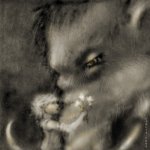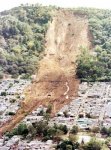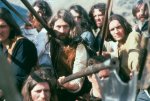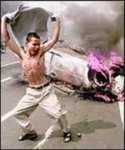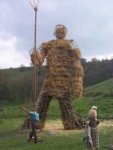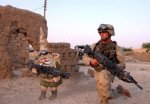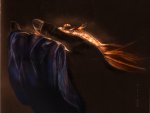Round 2, Match 1: CarpeDavid vs BardStephenFox
The Strange Tale of Arthur Peddington
Dear Charles,
I write to you this evening, in the hope that, once you regain the use of your faculties, you will be able to verify my account of the dreadful circumstances surrounding the loss of our expeditionary party. As the only other survivor of the voyage, you are in a unique position to confirm the veracity of events that, in any other circumstance, would be considered the work of one of those dreadful pulp authors that are so popular these days.
You may ask why I must commit these words to paper, when there is the greatest possibility that you may never emerge from your current state. To answer you, I must begin by relating the events that occurred this very evening, in the same room from which I am now writing.
I was sitting in my study, enjoying a cup of gunpowder tea, when I heard a knock on our front door. As my legs are still weak, and walking is sometimes painful, my wife answered the door in my stead, returning after only a minute with a parcel wrapped in brown paper and bound with twine. She then bid me goodnight and retired for the evening, leaving me to my paperwork.
Using the metal shears that I keep for the opening of packages, I snipped the twine and unwrapped the paper. Without much thought, I lifted the lid and placed it to the side, but when I looked down in the box, I did not find a sheaf of academic papers to be read. Indeed what was in the box defies logic and reason, and I sat for more than an hour with my mouth agape before I could force myself to comprehend it. In the bottom of the box, pinned to whiteboard like a butterfly or moth,
was a human face - complete and undamaged [faceoff.jpg].
But I write too much too quickly, for, in order for you to comprehend whose disembodied face stared back at me, you must remember the events that transpired on our excursion to Peru.
It was at the end of August that you, Pickman, and I left Arkham with a group of eight graduate students. At the time, of course, I was delighted to have been selected, since we linguists don't get out into the field much. Pickman was eager to catalog the esoteric artwork of the ancient Incans, and so was as much delighted as I. Now of course, I wish I had never heard of the damned Incans, a sentiment I'm sure Pickman would share, were he still alive.
Again, though, I get ahead of myself. Let me state the facts as I know them. The eleven of us set sail from Boston on the 28th of August, and spent the next two weeks at sea, passing through the newly-built canal, then landing in Lima on the 11th of September. From there, we spent another week riding into the Peruvian Andes. Along the way, I spent time cataloging different dialects of Quechua, the language shared by the ancient Incans and the modern Andeans.
Pickman spent his time making sketches of the native artwork. Because his artwork often possesses a grotesque quality, I was impressed at how accurately he was able to capture the beauty of Andean craftsmanship. Of all the information that we collected though, it was the tale that you recorded from the kite flyer that now seems most prescient.
The old fellow was attempting to launch
a kite shaped like an enormous crow as you approached him, [battyoldman.jpg] and it snapped up into the air as a gust of wind came out of nowhere. When asked about the cultural significance of the kite, he told us of the Cusco, an ancient race of giant birds from the lands among the stars, who could take the forms of men, and possessed advanced knowledge. It was they who founded the Incan empire, who taught mankind how to build the pyramids, and who the Incan capitol was named after.
The Cusco, he claimed, still watched over the Andean people, and protected them from outsiders who wished to exploit them. They had the power, he warned, to know everything about you if they were able to collect even a single strand of your hair. Ah, Charles, if only we had heeded his warning, instead of chalking it up to a regional superstition, as we always do. Think of where we would be now.
At the end of the first week, we finally reached the unexplored jungle. Based on the maps provided by previous expeditions, you had mapped out a course that you believed would provide the greatest chance to find lost ruins. You lead the initial charge that first day, cutting a path with your machete, while Pickman kept showing me his sketches of flowers with giant, colorful blossoms. I was delighted to see him so enthralled with a subject that didn't have its origins in the realm of nightmare. The students did a commendable job of transporting our equipment along the difficult terrain, and I attempted to help whenever possible, even though I am not one accustomed to strenuous physical effort.
The first night sleeping in the wild was both exciting and frightening. The sounds of civilization had faded long ago, so the jungle noises were especially audible - we all slept fitfully that evening. After the second day, though, we were all tired enough to sleep soundly, blocking out the sound of the monkeys jumping through the trees.
The moon was waxing, which allowed some light to filter through the jungle canopy, and I awoke while it was near its apex after feeling something poke my head. I opened my eyes to see what looked like a man-sized bird standing over me. As I scrambled for my spectacles, though, the figure took flight - I could feel the wind generated by its wing against my face. By the time I was able to clearly see, it was gone, having flown up over the treetops at a rapid pace.
I could feel my heart pumping rapidly. What had I just seen? Without the benefit of my spectacles, I could not be sure even of its size. It had certainly seemed large, as I stared up at it, but it might have been a trick of perspective. I convinced myself that it was some form of native vulture, searching for a late-evening meal. When I mentioned it the next morning, and both you and Pickman related similar experiences and conclusions, I felt relieved.
By the afternoon of the fifth day, I was beginning to wish I had rejected your offer. The air, thick and humid, was taking a toll on my delicate New England constitution, and the mosquitoes, which were covering all of us in welts, weren't helping. I was about to suggest that we stop for a break when Pickman and I heard you yell. We pushed up the path, and discovered that the ground fell away. At first I thought you had fallen, but, looking down, I realized that you were rapidly descending of your own accord.
As I peered over your shoulder, I could see what had made you so excited:
filling the valley below us was a vast, stone city [topofthemorning.jpg], proudly standing in defiance of centuries of disuse. I think we three were all giddy, as you, Pickman, and I scrambled down that cliff face. Surely this is how Bingham must have felt when he discovered Machu Picchu not three years ago! The prospect of discovering our own lost city made us reckless, and led to our first error.
Instead of instructing the students to find a more suitable course of descent, we ordered them to bring the supplies down using ropes and pulleys. It was during this activity that Martin Whately, of the Whateleys of Dunwich, slipped and fractured his femur. His screams of pain echoed through the stone corridors of that valley city, and it wasn't until we administered morphine that he was able to calm down.
Fearing that harm might befall more students, we left them to take care of Whately while we made a cursory examination of the ruins. At the time, we marveled that the jungle had not encroached on this city in the least. Bingham had spent months cutting back overgrowth at the Lost City of the Andes, but we had no need for even a cursory use of the machete.
I believe I saw the great pyramid first. I rounded a corner, and there it was, standing in the middle of a grand plaza. A grand staircase led from base to top, and nearly every inch was covered in carvings of birdlike creatures. Pickman gasped, while you, I recall, let out a squeal of glee.
Pickman stayed behind to make drawings of the carvings while we climbed the ninety-one stairs to the top. From our new vantage point, we had a fantastic view of the city. The streets radiated out from the plaza like spokes from a wheel, with circular connecting passages. Behind us, the setting sun burned a bright gold-orange, causing the pyramid to cast a massive shadow that stretched the breadth of the plaza.
We remained at the top for a long while, I think, enjoying the magnificence of our discovery. When we finally climbed back down, the sun had nearly set, and Pickman had already lit his lantern. I lit a torch off of his lantern, and suggested that we return to the students, when Pickman informed us of a discovery he had made.
Leading us around the corner of the pyramid, he pointed to an opening in the base, sealed by a rectangular stone door. You should have seen your eyes at that moment. They were wide in wonder, and you reminded me of baby just discovering the world.
"Have you opened it?" you asked.
"I tried, but it's too heavy for me alone," Pickman replied.
"Well, then, let's the three of us take a crack," I suggested, and the three of us pressed our shoulders against it. With a hefty push, the door slid back, and we stumbled through. You, Charles, lit your own lantern and held it aloft. Oh, now, how I wish you hadn't, for we would never have known what was inside.
The lantern illuminated a large chamber that was lined with glass tubes, and each was filled with the body of a human. We crept around the edge of the chamber, peering at each of the figures as we passed. All of them possessed Andean features and skin color, though all ages seemed to be represented equally. There were more women than men, and each tube had a label affixed to it that appeared to be etched with a script I was unfamiliar with.
It wasn't until we had circumnavigated the entire chamber that we found the eleven bodies that were not of Andean appearance. Indeed, each was of a Caucasian male. They should not have existed, but there they were, mocking everything we knew about the natural world: perfect representations of our entire expedition party.
Pickman acted first, smashing the tubes and emptying his lantern oil on the bodies. I followed his action by applying my torch, setting the simulacrums alight. I know that, as a man of science, I should want to know why they were there, but I feel no remorse. Reality simply cannot abide that kind of abomination.
As we ran back through the streets of terrible city, I felt certain that we were being watched, that bird-shaped figures were moving in the shadows. We emerged from the city at a breakneck pace, and slowed only when we came within sight of our students. Retreat was paramount, that was obvious, but we could no longer return up the cliff, due to Whately's broken leg.
Fortunately, one of the enterprising students had fashioned a sedan from two young trees and a supply box. We gave him more morphine, handed him a lantern, and then hefted the entire contraption up onto our shoulders. You, Charles, kept a level head, and were able to visualize an alternate route back to our original path.
As we carried Whately away from the city, the clear night sky began to cloud over. We were an hour into the jungle when the heavens opened up, and the rain began to fall. The ground became muddy, and we almost dropped Whately twice before we came to the river. On the other side was freedom: the path we had cleared on our approach. In our way, however, was a river quickly swelling from the pouring rain.
We pushed forward, the sedan held high above our heads. The water roared past our chests as we struggled toward the other side. Suddenly, one student slipped, and the current ripped him away. After ten more feet, another one slipped, and disappeared beneath the surface, and the whole sedan dropped to one side.
Whately screamed as he slammed to one side, and then screamed again when the lantern broke, spilling oil everywhere. Suddenly the sedan and Whately were both in flames, as
we struggled with all our might against the raging river [needalight.jpg]. We had no choice, but to give Whately up.
As the rest of the party collapsed on the other side of the river, I realized that this must have been the work of the bird-men. If they had the technology to make copies of men, what other terrible science did they possess? The ability to harness weather certainly seemed within their grasp.
We ran back through the jungle. It took us two days.
I don't know why I had thought we'd be safe once aboard the ship. I guess I thought we'd outrun them. I remember that we spent the first two days in mute shock. Pickman kept to his room, while you sat on the deck, starting up at the sky.
Then on the third night, they found us again. A storm swept in from the south, pounding the ship with wind and rain. The sea became choppy, rocking the ship to and fro, which finally brought Pickman from his room. I remember that he said nothing to either of us as he lurched toward the rail.
The captain advised us to return to our rooms, but I don't think any of us were prepared to be alone at that point. The storm increased in intensity, and the power of the sea grew stronger. Waves broke over the bow, soaking the deck, and chilling me to my core.
In a flash of lightning, I saw our doom:
a great, skeletal beast hovering over the ship [cold.jpg]. With one clawed limb it grabbed Pickman from his position at the rail, and tore him in half, tossing the remnants into the sea. I tried to scream, to warn the others, but the sound of thunder and crashing waves drowned me out.
Lighting lit the scene again, and I saw the boney beast grab the captain and snap him in two. It tore into the ship next, rending the hull with its claws. The sound of metal tearing pierced the air as the ship lurched to one side. I saw one of the students fall into the sea, and knew that he was gone.
I screamed and screamed, and fell into the sea.
The doctors say that we were floating for a full week before the rescue vessel finally located us. We were dehydrated, starving, and baked from the sun. It took fourteen days before I regained consciousness, and I'm told that my wife sat by my side the whole time. It is only with her help that I have recently managed to return to my post at the University.
To return to the scenario that prompted my correspondence in the first place: surely the sight of a human face, removed from its host, and pinned to a board, would be enough to cause anyone to question his own sanity. In this case, however, this hideous encounter prompted exactly the opposite speculation. For the past month, I have been desperately clinging to the explanation that my recollection of our excursion had been delusional in nature, induced by the dehydration we suffered while adrift at sea. Indeed, I had nearly managed to push the events from my mind before tonight, but now I am sure that they occurred precisely as I remember them.
For you see, Charles, the face that arrived in the parcel this evening...it was mine!

